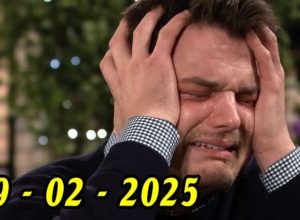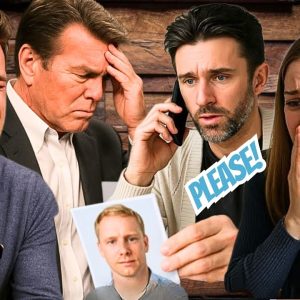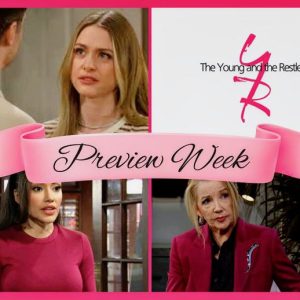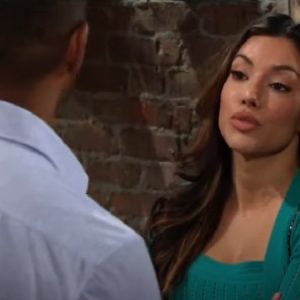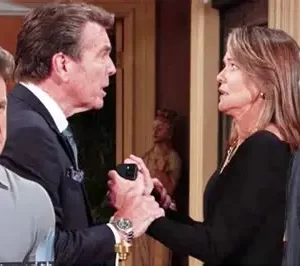Brace yourselves, Genoa City faithful, as The Young and the Restless: The Reckoning hurtles into a new era of high-stakes drama and emotional turmoil! Following the recent, devastating losses of Damian (Jermaine Rivers) and Chance (Conner Floyd), the film doesn’t offer a moment’s reprieve. Instead, it thrusts viewers directly into the heart of fresh crises that threaten to shatter family bonds and redefine key relationships. From the relentless frustration of parents burdened by a perpetually wayward son, to the undeniable resurgence of passion between two “just friends,” and the unyielding command of a patriarch determined to control every aspect of his family’s lives, this movie promises a compelling blend of urgency, raw emotion, and multiple storylines colliding with explosive force.

Kyle’s Endless Cycle: Parental Despair and the Burden of Recklessness
The movie immediately focuses on the profound and enduring burden carried by Diane Jenkins (Susan Walters) and Jack Abbott (Peter Bergman), stemming from their son Kyle (Michael Mealor). Despite the recent shock and grief over the deaths of Damian and Chance, the film quickly shifts their attention to their son’s latest misadventure, underscoring the relentless nature of his problematic behavior. The narrative portrays Jack and Diane as two parents pushed to their absolute limits, their worry palpable and their patience worn thin.
The core of their despair lies in Kyle’s frustrating, cyclical pattern of self-sabotage. No matter how many times Kyle attempts to “reassure his parents that he has everything—Audra (Zuleyka Silver), Claire (Hayley Erin), Victor (Eric Braeden)—under control,” his parents are anything but convinced. The film highlights their painful history, demonstrating that their skepticism is hard-earned. They have “watched Kyle screw up over and over and over again,” a relentless parade of poor choices and impulsive actions.
What truly exacerbates their frustration is Kyle’s predictable response to his self-created predicaments. He invariably “come[s] crying to his Mommy and Daddy, demanding they fix his screw-up,” showing a profound lack of accountability. Even more infuriatingly, once his parents have, as usual, stepped in to mitigate the damage, Kyle often denies his culpability, acting as if “he’d ever screwed up. It’s what he’d meant to do all along.” This infuriating cycle of reckless action, desperate plea for help, and subsequent denial drains Jack and Diane emotionally, leaving them exhausted and increasingly resentful.
For a brief period, the recent tragedies in France provided a grim distraction. “For a few days, Diane and Jack were too busy being horrified by Damian and Chance’s deaths to focus on what Kyle has done now.” However, the movie signals a stark return to their perennial torment: “But it’s time to focus on what Kyle has done now. And to deal with it. And to deal with Kyle’s frustration at being challenged about… anything.” This portends difficult confrontations ahead, as Kyle’s arrogance and inability to accept criticism will undoubtedly clash with his parents’ desperate attempts to intervene. The film hints at the looming consequences of Kyle’s current entanglements with Audra, Claire, and even Victor Newman, suggesting that his latest “stupid thing” might have far-reaching implications that even his long-suffering parents will struggle to contain.

Sharon and Nick: The “Just Friends” Illusion Shatters in France
Amidst the Abbott family drama, The Young and the Restless: The Reckoning also delves deep into the ever-complex and perpetually intertwined lives of Sharon Newman (Sharon Case) and Nick Newman (Joshua Morrow). The film captures their latest, seemingly innocent, regression into their “familiar patterns,” a dynamic that has captivated fans for decades. Sharon’s decision to follow Nick to France was initially presented as a purely platonic gesture, framed as being “just a friend.”
However, the thin veneer of platonic friendship quickly begins to crack under the pressure of shared danger and emotional intensity. While in France, Sharon is forced to witness one of Nick’s infamous, yet undeniably endearing, traits: his tendency for “patented, stupid, unthought-out dramatic heroic gestures.” These impulsive acts of courage, while often saving the day, invariably put Nick in harm’s way. The film portrays the alarming consequence of one such gesture, which “ended up slicing up his side,” causing a serious injury.
This moment of crisis proves to be a catalyst for their true feelings to surface. Despite their professed “just as a friend” status, “Sharon worried and fretted about him,” her concern transcending the boundaries of mere platonic affection. The intensity of the situation, coupled with Nick’s vulnerability, strips away their carefully constructed emotional barriers. As they prepare to head “back to Genoa City,” the movie poses the lingering, poignant question that hangs heavy in the air between them: “But are they really still just friends after all that?” This question is more than rhetorical; it is a powerful “spoiler” that hints at an undeniable romantic rekindling, suggesting that the perilous events in France have irrevocably altered their relationship, pushing them beyond the realm of platonic friendship and back towards a passionate, complicated reunion that fans have long hoped for.

Victor’s Iron Fist: The Patriarch’s Unyielding Command
Finally, The Young and the Restless: The Reckoning showcases the unyielding authority of Victor Newman (Eric Braeden), the patriarch whose word is law. The film captures Victor in his quintessential role as the commander of his family, particularly evident in the aftermath of the chaotic events in France. Having achieved whatever objectives he set out for, “Victor is all done in France.” His decisive nature leaves no room for debate or dissent.
His command to his family is abrupt and absolute: “Alright, family, pack up, time to go home, your patriarch has spoken.” This declaration isn’t a suggestion; it’s an order, reflecting his profound belief in his right to dictate the lives of those around him. The film emphasizes the futility of resistance against Victor’s will. “If anyone had anything they wanted to take care of first… nope, no time.” Any lingering personal business, any desire for further investigation, or any emotional processing of the recent tragedies is to be immediately set aside in favor of Victor’s decree.
The finality of his decision is underscored by his unwavering tone: “Victor said they were done. This means they’re done. He will not be taking questions—or objections—at this time.” This highlights Victor’s unassailable position of power, where his pronouncements are not open for discussion, challenge, or even clarification. His decision to bring everyone home immediately implies a desire to reassert control, to consolidate his family within the familiar confines of Genoa City, and perhaps to manage the fallout of the recent events on his own terms. This absolute authority will undoubtedly have significant consequences for the other characters, particularly those who may have had unfinished business in France, or who now find their personal struggles abruptly cut short by the will of The Moustache. Victor’s commanding presence ensures that even amidst personal crises and romantic entanglements, his will ultimately reigns supreme, shaping the direction of every storyline.
The Young and the Restless: The Reckoning delivers a potent blend of raw family drama, rekindled romance, and unyielding patriarchal power. It plunges audiences into the deeply personal struggles of the Abbott family, the undeniable chemistry brewing between Sharon and Nick, and Victor Newman’s absolute control over his domain. This cinematic experience promises to leave viewers on the edge of their seats, wondering about the future of Kyle’s schemes, the ultimate fate of Sharon and Nick’s bond, and the enduring impact of Victor’s iron-fisted rule as the saga of Genoa City continues.
